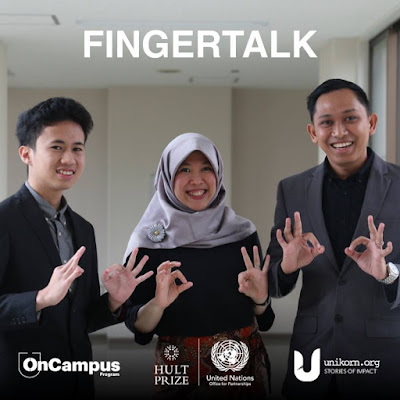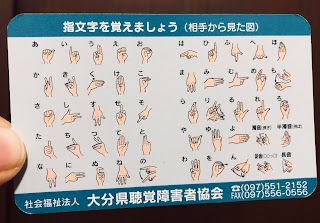HULT Prize: Finding Our Why, Once Again
2018 is coming to an end and one of the highlight of this year is to participate in Hult Prize competition in our campus, APU. Not only that it was one of the most well-known and prestigious student-competition for social entrepreneurship, but it has given me a chance to revisit the reason Fingertalk exists in the first place, and now, together with my husband and my brother, we are given the chance to spread our wings and make it bigger. We once again, are finding our why.
This year’s challenge is “youth unemployment”. As World
Economic Forum 2018 reported that one in five youth globally is neither
employed, nor engaged in formal education, or involved in training, youth
unemployment is an issue to be tackled none other by the youth themselves.
Therefore, teams are encouraged to come up with an idea of a venture that can
create 10,000 jobs for youths in the next decade while also creating
sustainable business operations.
Twelve teams of current APU students participated in the
campus round. Their ideas offer solutions in various sectors from farming,
fisheries and also technology. They targeted diverse groups of youth, from
youth with disability to unemployed university graduates.
 |
| Our team presenting our ideas |
Each team had 6 minutes to pitch their ideas to a panel of judges with additional 4 minutes for question and answer. On the first round of the competition, teams were divided into three divisions. The judges then chose two teams from each division to advance to the final round.
When my team and I decided to enter the competition, we felt
the challenge this year resonates to what we have been doing in our social
enterprise in Indonesia for the past three years. Our initiative, Fingertalk,
aims to empower underprivileged Deaf youths in Indonesia through job
opportunities and training, as many of them are often discriminated and stigmatized
in the society due to their disability. Thus, by participating in The Hult
Prize, we want to learn more on how we can scale our idea to create bigger
impact and more opportunities for the Deaf youths.
Hult Prize actually helped me to rethink, why did I make Fingertalk in the first place? Where do I want to see it grow in the next 5-10 years? Do I want to scale the enterprise or stay in this comfort zone?
I say comfort zone because currently Fingertalk is running on its own independently. With me in Beppu, the crew and the rest of my team in Cinere and Pamulang are doing business as usual. As a founder, it is comfortable of course, but from what I have learned in life, I do not do well being comfortable :P
So, when I saw that APU was having their campus round, I discussed scaling up ideas with my husband, Hijrah and called up my brother, Rizqi and formed a team. Surprisingly, we worked really well together! I could feel the enthusiasm in my team, and the genuine intention, not only to create 10,000 jobs for the youths, but to change perception, stigma, that many underprivileged Deaf youths have to deal with in our country, Indonesia.
Building up to the event, we worked on our presentation. Not only the slides, but our story. What is it that we want to tell? Why are the underprivileged Deaf youths our beneficiary? Why is this important? Why do people have to care?
As the founder of Fingertalk, I may be able to answer the above with my eyes closed, but Hijrah and Rizqi were there to question me and establish one very important aspect, the one that the investors want to know - after all, Hult Prize is like "Shark Tank" for social enterprise, we must convince the investors - which is the profitability. We crunched our numbers, discussed our scaling up plan, the sustainability, we even called our team in Jakarta and asked their input on it. We kept on discussing, how can we make this impactful. That was the spirit that we brought into the D-Day on Sunday, 16 December 2018.
 |
| Some of the judges in the final round |
We got the last slot on the first round, division A, team number 4. When our turn came, we were escorted to the room where the judges waited. Six minute went by so quick, so did the QnA session. We were thankful for the questions, the comments and also the suggestions that the judges gave us. We took mental-note of everything happening the room. We did our best, now we just had to wait for the announcement, of whether or not we make it to the final of our campus round.
After the first round, we were very surprised when the judges
announced that we, Fingertalk, were one of teams that advanced to the final
round. As we were the team from division A, we had the chance to present first. Right after the judges announced, and right in front of everyone. No time to be nervous; we presented our idea one more time and hoped for the best. We were also
inspired by other finalists and the uniqueness of each of their approach. I was personally moved by the interests of creating for good, for profit business that sparked among all of the participants.
Then, the judges announced that WE WON!
Wait, what?
Alhamdulillah!
However, this is a start to a journey of creating bigger impact.
Next task is to represent APU for the regional round, and we promise that we will give our best!
Ganbarimasu! Bismillah :)
Wait, what?
Alhamdulillah!
However, this is a start to a journey of creating bigger impact.
Next task is to represent APU for the regional round, and we promise that we will give our best!
Ganbarimasu! Bismillah :)
 |
| Our team with Aaron and Prof. Pardo right after the winner announcement - posing with Fingertalk in sign! |
 |
| Official winning photo! (And of course, Rizqi :P) |
 |
| Thank you APU, next is regional! |







Comments